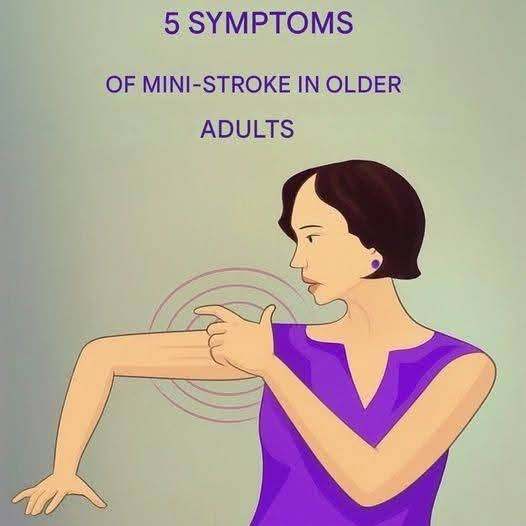Strokes, also known as strokes, are critical medical emergencies that can affect anyone, although they are more common in the older population. In this age group, a mini-stroke, also called a transient ischemic attack (TIA), often presents with symptoms that are temporary, but should not be ignored. Catching these signs early can be crucial to a person’s long-term health. Here are five key symptoms that may indicate a mini-stroke in older people.
- Sudden Loss of Strength or Sensation in a Part of the Body
One of the most common symptoms of a mini-stroke is a sudden loss of strength or sensation on one side of the body. This can manifest as weakness in one leg, arm, or even face. The person may notice that they cannot lift an arm or that their smile seems asymmetrical. This kind of weakness is temporary, but it’s a clear sign that something is going on. It is critical for caregivers and family members to be aware of these changes and seek immediate medical attention. - Difficulty Speaking or Understanding Language
Slurred speech is another notable symptom of a mini-stroke. Older people may manifest inconsistencies in their speech, confusing words, or may even remain silent when trying to respond. In addition, they may have trouble understanding what other people are saying. This is because temporary brain damage affects the areas responsible for language. Dysarthria, or difficulty articulating words, may be indicative of a TIA, and should be evaluated by a medical professional. - Vision Disturbances
- Visual disturbances, which are often overlooked, are another symptom of a mini-stroke. This can include blurred vision, loss of vision in one or both eyes, or double vision. These visual abnormalities can be quick and temporary, but they can alert you to problems with blood flow to the areas of the brain that process visual signals. Seniors should have regular eye exams and be alert to any sudden changes in their vision.
- Dizziness, unsteadiness or loss of balance are symptoms that should not be ignored either. A mini stroke can affect the brain in a way that causes a feeling of vertigo or disorientation. Seniors may feel as if they are about to faint or experience difficulty standing. This relates to the affect of certain areas of the brain that control balance and coordination. If an older person is showing unexpected symptoms of dizziness, it is essential to seek immediate medical attention.
- Sudden and Severe Headache
Although headache is not always a classic symptom of a mini-stroke, a sudden, severe headache that has no apparent cause may be related to a TIA. This type of headache can be described as the “worst headache of your life” and, although it is more common in full-blown strokes, it can be indicative of serious problems. This symptom should be taken seriously and should lead the person to seek medical attention immediately.
Recognize and Act
It is crucial that both older people and their caregivers are proactive in identifying these symptoms. Mini strokes are a warning that a full-blown stroke could be on the horizon. Ignoring them can result in permanent brain damage or even death. Prompt evaluation and treatment of symptoms can help prevent a more severe stroke, which can lead to severe and long-lasting complications.
Some risk factors that can contribute to mini-strokes include hypertension, diabetes, high cholesterol, and smoking. Therefore, regular medical evaluations are essential to monitor and control these risk factors in the older population. Brain health education and symptom identification are critical steps in prevention.
Finally, it is imperative that families and communities report the signs of a mini-stroke. Educational campaigns can make a difference in early recognition of symptoms, leading to prompt and appropriate intervention. Awareness and action can save lives and improve the quality of life of older people.
